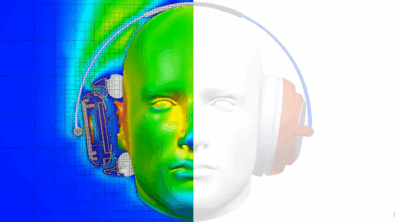The future for the next generation of engineers is…VUCA

To launch our new Simcenter for Academia blog series, we thought we’d kick off the first one by highlighting the future of engineering. Over the next weeks and months, we’ll take some time to explore the exciting world of comprehensive digital twins…including the latest cross-domain simulation and testing processes. Plus we’ll talk to some industry insiders and pioneers, people with decades of experience, who have seen incredible changes in the world of engineering. They share their vision of engineering education. Finally, we will give you some more insight into the Simcenter academic portfolio. We unveil what’s behind our educational platforms, and share what your peers have to say about Simcenter for Academia. Read on…
What the future really holds for the next generation of engineers
VUCA stands for volatility, uncertainty, complexity, and ambiguity. Considering the times, this acronym is pretty spot on when it comes to what the future generation of engineers will be facing. Indeed it’s 2020 and the world has changed. Never before have we been at crossroads like these. We have entered a global, hyper-connected era that will require profound engineering from a new generation of creative innovators. Tomorrow’s engineer will be a multi-tasker, challenged to contribute solutions to some of the most pressing issues of our times like increased urbanization, global warming, green energy, autonomous vehicles and machine learning, 5G…
Global trends aside, the industry also faces its own set of challenges. Engineers and designers today need to create products that consumers want to put their money behind. Customized, eco-friendly, affordable and connected or autonomous products that don’t compromise safety, energy efficiency, and ethics are all the name of the game. This means an enormous level of complexity when it comes to product development – not only for the product itself, but throughout the product lifecycle. An open mind and adaptability to new ways of thinking is going to be a major professional attribute for any engineer dealing with these exciting technological challenges.
“Think Big” to succeed
Shifting to this new engineering approach across a variety of industries obviously requires new skills. It requires understanding digital twins, advanced simulation techniques, but also tried-n-true testing and validation best practices. Besides all these new skills, the next generation of engineers will need to “decompartmentalize” and start to work in unified environments where an open mind towards multi-domain engineering and interdepartmental collaboration reigns.
Digital tools to build the products of tomorrow
Digital twins and high-fidelity digitalization tools are essential when supporting the pace of innovation required in this hyper-speed engineering environment. Indeed, designing complex products that meet – at times — conflicting performance criteria is a daily challenge for product designers and engineers. But how can one manage all this conflicting technology and product complexity? By implementing the right cross-domain engineering tools, comprehensive digital twins, and testing and validation processes, like those found in the Simcenter portfolio, engineers can help turn complexity into a competitive advantage.

Educational challenge: the skillset to meet these new ways of work
High-fidelity simulation and testing processes, digitalization and comprehensive digital twins…This is all exciting in theory, but what about in practice? How can educators prepare the next generation of engineers for all of this? Where does the curriculum need to adapt? Let’s look at a solid example. About 80% of the companies interviewed by Tech-Clarity[1] for the e-book, How Academia can close the engineering skills gap in the age of digitalization, claim that hiring the right engineers will be critical to business success. Clearly, the new fast pace of change in business will require an adaptive mindset, but also, let’s not forget, that quite a few experienced engineers will start thinking about retirement and possible taking years of hands-on knowledge with them.
Interesting enough, many of these same companies report difficulties in filling new positions due to a mismatch between industry expectations and students’ knowledge and skills. Part of the problem comes from the gap between the skills taught in academic environments and real, hands-on industry needs.
So just what are the real expectations? Tech-Clarity reports that engineering software is at the top of the list.
“While understanding the picks and clicks of the software is important; most companies also want students to be able to apply the technology to solve problems,” reports Tech-Clarity from its findings.
Close the Engineering Skills Gap: Prepare New Graduates to Be Real-World Ready
A combination of solid software knowledge, hands-on problem-solving experience in a working environment, and concrete knowledge of engineering theory is vital to effectively prepare the next generation of engineering students. Unfortunately, it seems that problem-solving and multi-domain systems engineering are among the top 10 skills that academic institutions do not prepare students well enough for, according to the same companies interviewed in the Tech-Clarity report.
Think past the software
Today, leading companies know that the comprehensive digital twin is a core competitive advantage. It breaks decades-old engineering silos and integrates innovation and know-how into the virtual and physical, hardware and software, design and engineering worlds. Adapting to the digital twin and this new engineering normal requires a “digital native” engineering mindset with a willingness to think past the software and engineering processes to embrace the creative power of the digital twin. This is the future of engineering.
[1] Close the Engineering Skills Gap: Prepare New Graduates to Be Real-World Ready https://www.plm.automation.siemens.com/global/en/topic/graduates-real-world-ready/11547
Get the latest news : https://blogs.sw.siemens.com/simcenter/tag/academic/


